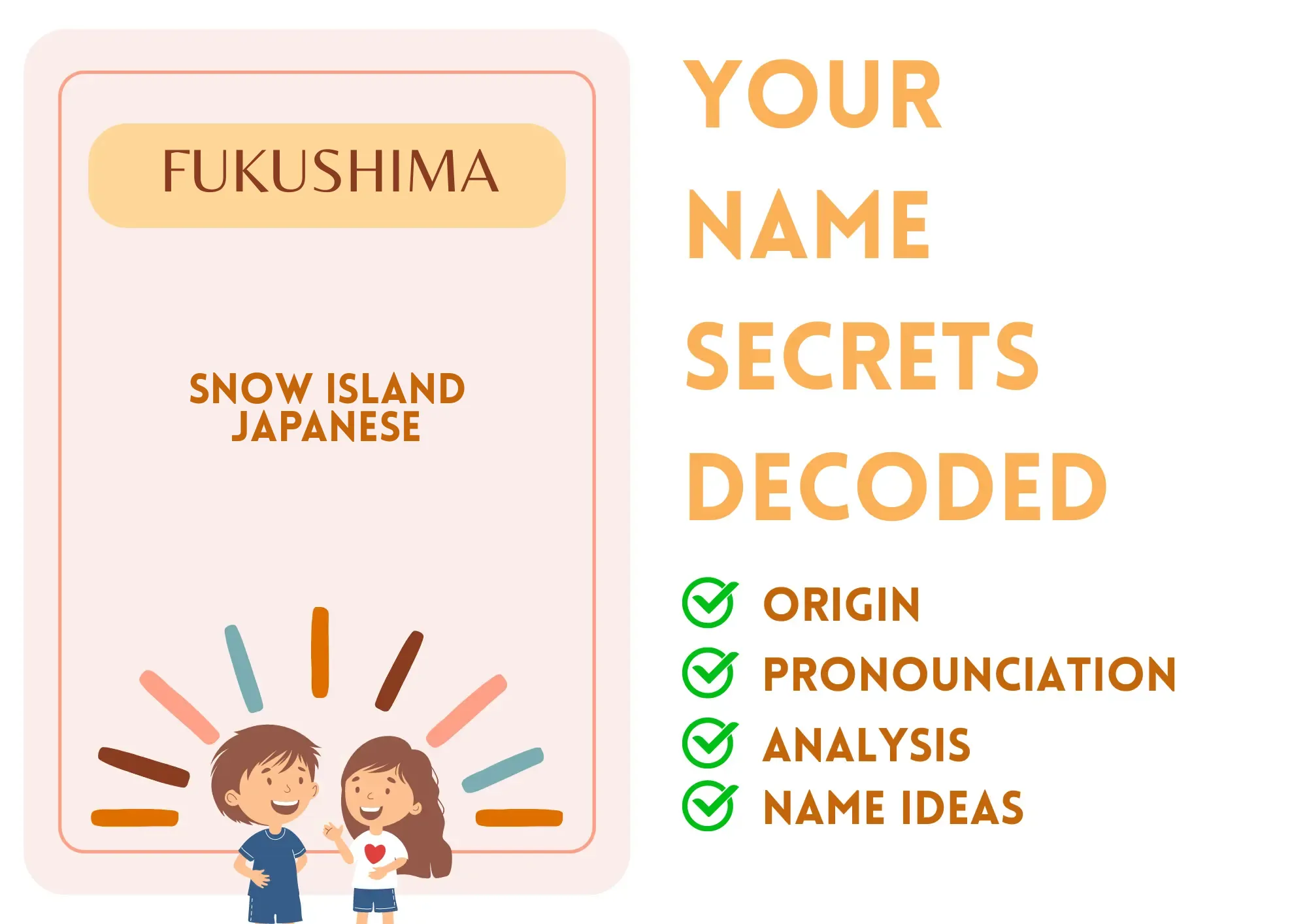
Fukushima
Fukushima is a name originating from Japan, which means "snow island". The name is well known due to the town Fukushima, which gained international attention after the 2011 earthquake and tsunami led to a nuclear disaster at the Fukushima Daiichi Nuclear Power Plant. This name is largely geographical and cultural in significance rather than used as a common personal name, especially outside Japan.
Although it is not commonly used as a first name, Fukushima represents resilience and recovery in the context of the disaster. The name evokes a range of feelings, from sadness regarding the tragedy that took place to admiration for the strength of the local population in rebuilding their lives.
In terms of writing and pronunciation, Fukushima is relatively easy to pronounce for those familiar with Japanese phonetics, although it might present a challenge for others. The name is often misspelled as 'Fukashima' or 'Fukushima'.
Basic Information
Gender: Unisex
Sounds Like: foo-koo-shee-ma
Pronunciation Explanation: The name is pronounced with an emphasis on each syllable, "foo" as in food, "koo" like the sound 'coo', "she" like in she, and ending with "ma" as in mama.
Summary and Meaning
Meaning: snow island (Japanese)
Origin: Fukushima has Japanese origins, specifically linked to a region in Japan known for both its natural beauty and the recent tragedy.
Usage: Fukushima is a unisex name but is rarely used as a personal name.
Name Number (Chaldean)
Name Number (Pythagorean)
Popularity (Global Rank)
Overall: 109578
Boys: 72681
Girls:
Most Popular in
Religious and Cultural Significance
Religion: Shinto
Background: The cultural context of Fukushima is steeped in Shinto beliefs, which emphasize the importance of harmony with nature and community resilience.
Cultural Significance: Fukushima as a name is deeply connected to the historical event of the 2011 disaster, symbolizing both beauty and struggle within Japanese culture.
Historical Significance: Fukushima has gained a significant historical connotation since the nuclear disaster in 2011, symbolizing the aftermath of natural disasters and human resilience.
Popular Culture
Literature and Mythology: The name Fukushima has been referenced in various articles and documentaries discussing the 2011 disaster and its implications.
Movies and Television: Documentaries such as 'The Tsunami and the Cherry Blossom' discuss the aftermath of the disaster that occurred in Fukushima, bringing awareness to its cultural significance.
Feelings and Perceptions
Perception: Fukushima evokes mixed feelings - a balance of appreciation for its natural beauty and sorrow regarding the disaster. It is associated with resilience and recovery.
Positive Feelings: Resilient, hopeful, natural beauty, strength.
Negative Feelings: Sadness due to the tragic events associated with the name.
Practical Considerations
Ease of Writing and Calling: Fukushima may be challenging for speakers unfamiliar with Japanese phonetics. It is a longer name, consisting of eight letters, but it remains memorable.
Common Typos and Misspellings: Fukashima,Fukoshima,Fukushimma,Fukishima
Common Nicknames:
Fukushima Popularity
Fukushima Usage and Popularity By Country
| Country | Rank (Overall) |
|---|---|
| Japan | 1593 |
| New Zealand | 33723 |
| Switzerland | 35738 |
| Spain | 63520 |
| France | 98610 |
| Brazil | 99142 |
| Canada | 149654 |
| United States | 164599 |
| United Kingdom | 182431 |
Fukushima Usage and Popularity By City
| City | Rank (Overall) |
|---|---|
| Tokyo | 3125 |
| Sapporo | 214 |
| Sao Paulo | 30454 |
| Yokohama | 997 |
Compatibility Analysis
Famous Persons Named Fukushima
No results found for Fukushima.
Related Names
Similar Sounding Names:
Fukuda,Fujimoto,Fukuyama,Fujita
Similar Meaning and Related Names:
Sibling Name Ideas (Brothers):
Kaito ♂️
Ren ♀️
Buddhist, Shinto (Japanese), Confucian (Korean)